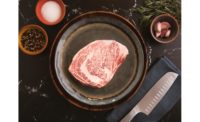Bring On The Steak!
By Sam Gazdziak, Senior Editor
Steak consumers are hungry for what the country’s meat processors have to offer.
Filet or Flat Iron, with or without antibiotics, seasoned or unseasoned, steaks are still high on the list of Americans’ favorite foods. It’s no wonder, either. Steak is such a versatile meat, and continued work of associations and processors to promote and add value to steaks only broadens that versatility.
Steak goes far beyond the traditional cuts of ribeyes, strips, T-bones and filets. Furthermore, it’s far more than just a dinner entrée. Steve Giroux, vice president of field sales and marketing, Brands Division, for American Foods Group of Omaha, Neb., notes the different cuts being offered on restaurant menus.
“[We have seen] the addition of prime rib sandwiches as the quick-service restaurant, along with several other ‘steak’ type offerings not only for lunch and dinner, but breakfast sandwiches as well,” he points out. “Consumers are always looking for something new to try.”
Processors have also had to deal with changes in the steak sector as the cost of middle meats, where the traditional cuts are found.
“Those have pushed both independent and national chains into looking at some more value-oriented items,” says Pater Bozzo, vice president of Chicago Meat Authority, which almost exclusively caters to the foodservice industry.
Bozzo says that the company does not cut many of the traditional steaks, and it has been successful at offering value cuts. “Customers who maybe had been offering something very traditional on their menu, like a ribeye steak, are now looking at how they can do something with a skirt steak, which is a generally undervalued cut of beef,” he says. Cuts from the sirloin and shoulder clod are also gaining interest.
Retailers are seeing some of those same trends, notes Al Kober, retail director for Certified Angus Beef, of Wooster, Ohio. “Certain muscles from the round and chuck, such as teres major, Flat Iron and Kansas City steaks, are becoming standard steaks in the retail case. Their success is leading the way to new efforts in muscle profiling from high-quality chucks. These cuts will continue to revolutionize how beef is merchandised and how we can best satisfy consumers’ needs for convenience.”
Kent Harrison, premium group brand manager for Sterling Silver® Premium Meats and AngusPride® Premium Beef for Cargill Meat Solutions, of Wichita, Kan., says that consumers are looking for a great eating experience every time they order a steak, which means a tender, consistently sized and great tasting product.
“Cargill recognizes that insight, and as a result, we implemented yield grade requirements for our premium brands and the use of technology to help predict the tenderness of a steak for more consistent programs,” he says.
Natural news
Natural and organic beef continue their upward growth patterns. While their overall sales are relatively small when compared to overall beef sales, natural and organic cuts of meat are moving from a niche in health food grocery stores to a staple of mainstream grocery stores and restaurants alike.
Laura’s Lean Beef may be a natural brand, but it is still mainstream enough to be sold in most of the large chains nationwide. “I have always been interested in providing a healthier beef to all shoppers, not just the customers of the health-food stores,” says Laura Freeman, founder and president of the Lexington, Kent.-based company.
Freeman says that her company’s visibly lean beef helps to attract customers, as does the packaging itself. “The thing that probably stands out most about the look of the product in the meat case is that I’m on the label,” she explains. “There aren’t many other women in this industry, and having my face, for better or worse, on the label really connects with the core grocery shoppers — women.”
Maverick Ranch’s Charlie Moore notes that the popularity of natural and organic meats is carrying over to other sectors. “Since many consumers make a conscious choice to buy natural and organic in grocery stores, they are now requesting it at their favorite restaurants.”
Maverick Ranch, located in Denver, supplies its Maverick Ranch Natural Choice Beef, NaturaLite Beef and Organic Beef to customers ranging from white-tablecloth restaurants to traditional and natural grocers. While the natural and organic segments are still relatively small, their rapid growth has definitely attracted the attention of the largest players.
“As this trend continues to grow in the future, Cargill will collaborate with its customers to create a product that will meet the current needs of its customers,” reports Kent Harrison, premium group brand manager for Sterling Silver® Premium Meats and AngusPride® Premium Beef for Cargill Meat Solutions. “We will continue to watch the natural and organic segments.”



Report Abusive Comment